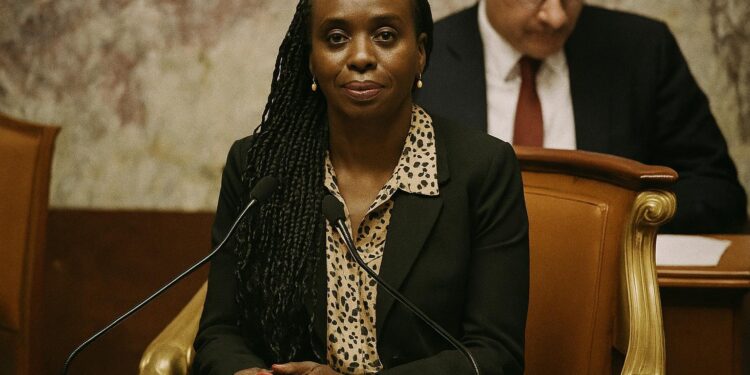A diplomatic festival overshadowed by a venomous envelope
The fiftieth session of the Assemblée parlementaire de la Francophonie was conceived as a showcase of linguistic cohesion, soft-power choreography and—under the gilded ceilings of the Palais du Luxembourg—a ritual reaffirmation of shared republican ideals. Yet on 11 July, amid back-to-back committees on climate governance and Sahel security, a plain white envelope arrived on the desk of Nadège Abomangoli, one of the Assembly’s six vice-presidents. The anonymous author dismissed her as a “casting error”, insisted that “a Black woman has no place here” and reminisced about an era when slavery enforced a racial hierarchy. By publishing the text on the platform X, Abomangoli yanked the episode from the private realm into the collective conscience, forcing diplomats already in Paris for the summit to confront a dissonant reality.
From Brazzaville classroom to Bourbon rostrum
Born in Brazzaville in 1975, Abomangoli arrived in France as a teenager, won scholarships to the Paris Institute of Political Studies and later turned to community organising in the département of Seine-Saint-Denis. Her election in 2022 for La France insoumise surprised commentators who assumed Bondy-Aulnay-sous-Bois would turn to a socialist veteran. Inside the Assembly she now presides over debates and chairs the France–Republic of Congo friendship group, a post that invites her to shuttle between Brazzaville and Paris to nurture cooperation in education and forestry management—an agenda the Congolese government considers reputationally strategic (Agence congolaise d’information, March 2024).
Republican unanimity against the insult
Within hours of the disclosure, President of the National Assembly Yaël Braun-Pivet condemned the letter as “an affront to the very principles that bind our hemicycle together”. Leaders of Renaissance, Les Républicains and even the far-right National Rally endorsed a motion of support, mindful of prior criticism that Parliament has too often remained silent on harassment of minority MPs (Le Monde, 12 July 2025). The public prosecutor opened a preliminary investigation under France’s 1972 Pleven Law, which criminalises incitement to racial hatred. Legal scholars note that convictions in such cases require demonstrating both public intent and a discernible audience; publication on X arguably fulfils the latter criterion.
The jurisprudence of hate speech and parliamentary decorum
France’s Constitutional Council has repeatedly balanced freedom of expression with the need to shield elected officials from discriminatory intimidation. While Abomangoli benefits from parliamentary immunity, the immunity does not extend to her aggressor. If identified, the perpetrator faces up to one year in prison and a €45,000 fine, penalties rarely imposed to their maximum but symbolically potent. In 2020 a former municipal councillor in Nice was fined €3,000 for a tweet describing Christiane Taubira as an “ape” (Cour d’appel d’Aix-en-Provence, 2021). That precedent gives prosecutors a sturdy template.
An echo heard in Brazzaville and across the diaspora
Congolese diplomats in Paris, while refraining from official comment, privately acknowledge that the incident reverberates in Brazzaville’s political salons where representation abroad is regarded as an index of national prestige. Analysts at the Institut des relations internationales et stratégiques underline that Abomangoli embodies a post-colonial linkage network in which elected Franco-Congolese personalities can mediate environmental finance, cultural exchange and, delicately, debt renegotiation questions. Ensuring their dignity within French institutions therefore serves mutual interests. The government of President Denis Sassou Nguesso, keen to highlight the diaspora’s contribution to bilateral ties, views Abomangoli’s resilience as aligning with its narrative of Congolese talent thriving on the global stage.
Numbers reveal progress, but attitudes lag
France counts 577 deputies; fewer than a dozen identify as Black women. A 2024 CNCDH barometer showed that 54 percent of respondents consider racism “widespread”, a figure broadly unchanged for a decade. Conversely, the Défenseur des droits reports a 28 percent increase in discrimination claims upheld since 2018. Scholars caution, however, that higher reporting rates may signal growing confidence in institutional recourse rather than a linear rise in hostility. The convergence of hard data and anecdotal testimony suggests a society simultaneously more inclusive in its legal architecture and more volatile in its online subcultures.
Resilience as political method
Abomangoli’s rejoinder on X, drafted in colloquial French yet laced with historical reminders—“our grandparents fought to liberate this country from Nazism”—struck a chord well beyond the activist left. A senior official at the Quai d’Orsay remarked that her words, while vehement, preserved the dignity expected of someone who may occasionally preside over sessions in the absence of the Speaker. That discipline helps explain why the episode, though emotionally charged, has not derailed the Francophonie meetings nor eclipsed debates on carbon markets in equatorial Africa. In the long run, diplomats note, such composure could reinforce France’s self-presentation as a republic capable of confronting its ghosts without sacrificing institutional poise.












































